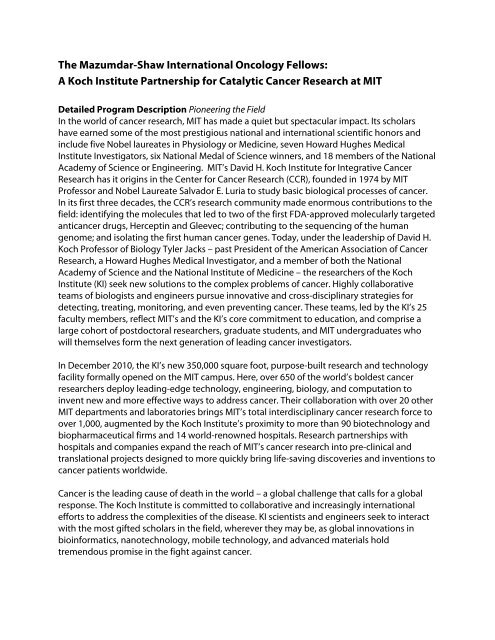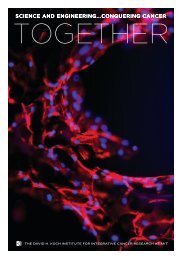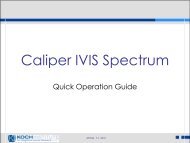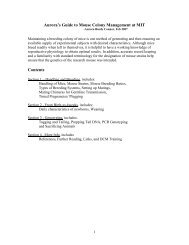Mazumdar-Shaw Fellowship Overview - The David H. Koch Institute ...
Mazumdar-Shaw Fellowship Overview - The David H. Koch Institute ...
Mazumdar-Shaw Fellowship Overview - The David H. Koch Institute ...
You also want an ePaper? Increase the reach of your titles
YUMPU automatically turns print PDFs into web optimized ePapers that Google loves.
<strong>The</strong> <strong>Mazumdar</strong>-<strong>Shaw</strong> International Oncology Fellows:<br />
A <strong>Koch</strong> <strong>Institute</strong> Partnership for Catalytic Cancer Research at MIT<br />
Detailed Program Description Pioneering the Field<br />
In the world of cancer research, MIT has made a quiet but spectacular impact. Its scholars<br />
have earned some of the most prestigious national and international scientific honors and<br />
include five Nobel laureates in Physiology or Medicine, seven Howard Hughes Medical<br />
<strong>Institute</strong> Investigators, six National Medal of Science winners, and 18 members of the National<br />
Academy of Science or Engineering. MIT’s <strong>David</strong> H. <strong>Koch</strong> <strong>Institute</strong> for Integrative Cancer<br />
Research has it origins in the Center for Cancer Research (CCR), founded in 1974 by MIT<br />
Professor and Nobel Laureate Salvador E. Luria to study basic biological processes of cancer.<br />
In its first three decades, the CCR’s research community made enormous contributions to the<br />
field: identifying the molecules that led to two of the first FDA-approved molecularly targeted<br />
anticancer drugs, Herceptin and Gleevec; contributing to the sequencing of the human<br />
genome; and isolating the first human cancer genes. Today, under the leadership of <strong>David</strong> H.<br />
<strong>Koch</strong> Professor of Biology Tyler Jacks – past President of the American Association of Cancer<br />
Research, a Howard Hughes Medical Investigator, and a member of both the National<br />
Academy of Science and the National <strong>Institute</strong> of Medicine – the researchers of the <strong>Koch</strong><br />
<strong>Institute</strong> (KI) seek new solutions to the complex problems of cancer. Highly collaborative<br />
teams of biologists and engineers pursue innovative and cross-disciplinary strategies for<br />
detecting, treating, monitoring, and even preventing cancer. <strong>The</strong>se teams, led by the KI’s 25<br />
faculty members, reflect MIT’s and the KI’s core commitment to education, and comprise a<br />
large cohort of postdoctoral researchers, graduate students, and MIT undergraduates who<br />
will themselves form the next generation of leading cancer investigators.<br />
In December 2010, the KI’s new 350,000 square foot, purpose-built research and technology<br />
facility formally opened on the MIT campus. Here, over 650 of the world’s boldest cancer<br />
researchers deploy leading-edge technology, engineering, biology, and computation to<br />
invent new and more effective ways to address cancer. <strong>The</strong>ir collaboration with over 20 other<br />
MIT departments and laboratories brings MIT’s total interdisciplinary cancer research force to<br />
over 1,000, augmented by the <strong>Koch</strong> <strong>Institute</strong>’s proximity to more than 90 biotechnology and<br />
biopharmaceutical firms and 14 world-renowned hospitals. Research partnerships with<br />
hospitals and companies expand the reach of MIT’s cancer research into pre-clinical and<br />
translational projects designed to more quickly bring life-saving discoveries and inventions to<br />
cancer patients worldwide.<br />
Cancer is the leading cause of death in the world – a global challenge that calls for a global<br />
response. <strong>The</strong> <strong>Koch</strong> <strong>Institute</strong> is committed to collaborative and increasingly international<br />
efforts to address the complexities of the disease. KI scientists and engineers seek to interact<br />
with the most gifted scholars in the field, wherever they may be, as global innovations in<br />
bioinformatics, nanotechnology, mobile technology, and advanced materials hold<br />
tremendous promise in the fight against cancer.
<strong>The</strong> <strong>Mazumdar</strong>-<strong>Shaw</strong> International Oncology Fellows Program<br />
To capture these opportunities, MIT has established the <strong>Mazumdar</strong>-<strong>Shaw</strong> International<br />
Oncology Fellows Program: a high-impact, bilateral collaboration with India focusing on<br />
cancer research training as its cornerstone. <strong>The</strong> aim of the <strong>Mazumdar</strong>-<strong>Shaw</strong> International<br />
Oncology Fellows Program is to help raise a new generation of cancer researchers in India<br />
whose careers and professional networks will be increasingly global. <strong>The</strong> broader mission is to<br />
build India’s position as an intellectual hub for oncology research from which significant<br />
advances are expected to emerge. This <strong>Fellowship</strong> program offers opportunities for<br />
postdoctoral scientists, engineers, and physicians to undertake cancer research at the <strong>Koch</strong><br />
<strong>Institute</strong> for Integrative Cancer Research at MIT, working at the interfaces between<br />
biology/medicine and the diverse fields of mathematics, engineering, computer science, and<br />
the physical and chemical sciences.<br />
Candidates will be expected to identify an important biomedical research question and to<br />
propose a project to extend their research interests and abilities. After their <strong>Fellowship</strong>,<br />
candidates will be expected to continue their research and share the benefit of their MIT<br />
training within an Indian host institution.<br />
What’s Included: <strong>The</strong> <strong>Mazumdar</strong>-<strong>Shaw</strong> International Oncology Fellows Program provides<br />
funding for:<br />
• A two year full-time postdoctoral research fellowship within the <strong>Koch</strong> <strong>Institute</strong> at MIT<br />
• Travel expenses to India for the researcher and a <strong>Koch</strong> <strong>Institute</strong> faculty advisor to share their<br />
research with colleagues with Indian peer institutions in India.<br />
<strong>The</strong> <strong>Fellowship</strong> is awarded with the expectation that the Fellows will subsequently continue<br />
their research in India. This funding will need to be secured separately from a host institution.<br />
<strong>Mazumdar</strong>-<strong>Shaw</strong> International Oncology Fellows will have extensive opportunities for<br />
substantive engagement with the KI research community, the larger Boston-area research<br />
community, and other postdoctoral researchers at MIT. At the KI, the Fellows will be<br />
encouraged to:<br />
• Collaborate with other researchers from within the <strong>Koch</strong> <strong>Institute</strong>’s 26 intramural and 23<br />
extramural faculty labs and from across MIT<br />
• Participate in a range of KI- and lab-sponsored programs, activities, and events<br />
• Attend regular lab meetings, weekly KI-sponsored research forums and seminars, projectspecific<br />
research retreats, and the annual KI research retreat.<br />
Beyond MIT, the Fellows will have the opportunity to:<br />
• Attend seminars sponsored by the many member hospitals of Dana Farber Harvard Cancer<br />
Center in the Boston area<br />
• Take advantage of MIT’s relationship with the larger life sciences, biomedical, and<br />
engineering communities in the Boston area.<br />
At MIT, the Fellows will be part of a dynamic academic community that includes over 800
postdoctoral scholars. In order to ensure a high quality of life for those pursuing postdoctoral<br />
research at MIT, fellows at MIT have access to a website for postdoctoral researchers at MIT,<br />
that provides links to:<br />
• the Postdoctoral Advisory Council<br />
• a calendar of postdoctoral seminars and events<br />
• the MIT Careers Office<br />
• the MIT International Scholars Office<br />
• the INet Internship Network<br />
• the MIT Postdoctoral Facebook and LinkedIn groups<br />
• and the MIT Postdoctoral Lunch Table.<br />
Research at MIT<br />
<strong>The</strong> applicant’s initial application will state the intended research objective with particular<br />
focus on the two years to be spent at MIT. <strong>The</strong> proposed research should fall within the <strong>Koch</strong><br />
<strong>Institute</strong>’s current research areas of focus:<br />
• Nanotechnology-based cancer therapeutics<br />
• Devices for cancer detection and monitoring<br />
• Molecular and cellular basis of metastasis<br />
• Analysis of cancer pathways and drug resistance<br />
• Immunology and cancer<br />
<strong>The</strong>se research themes are more fully described on the <strong>Koch</strong> <strong>Institute</strong>’s web site.<br />
<strong>The</strong> <strong>Mazumdar</strong>-<strong>Shaw</strong> International Oncology <strong>Fellowship</strong> will provide a stipend of between<br />
$37,368 and $47,000, depending on experience; additional support to cover expenses related<br />
to travel, health insurance, small items of equipment; and $40,000 per Fellow per year for<br />
research.<br />
Research Visits to India during the <strong>Fellowship</strong> Term<br />
<strong>The</strong> <strong>Fellowship</strong> is awarded with the expectation that the Fellows will travel to India once or<br />
twice per year during their <strong>Fellowship</strong> term to present their research to colleagues at peer<br />
institutions in India, and that during one of these trips their KI faculty advisor will join them.<br />
Funding for travel and related expenses covered by the <strong>Fellowship</strong> will require pre-approval<br />
by the <strong>Koch</strong> <strong>Institute</strong>.<br />
Post-<strong>Fellowship</strong> Research in India<br />
<strong>Mazumdar</strong>-<strong>Shaw</strong> International Oncology Fellows are expected to have plans for continuing<br />
their research work in India following their <strong>Fellowship</strong> at MIT. Funding for these research<br />
expenses in India are not included in this <strong>Fellowship</strong>.<br />
<strong>The</strong> award of funds for the second year of the <strong>Fellowship</strong> at MIT will require the formal<br />
approval of a progress report containing:
• a report on the first year research carried out at MIT<br />
• a statement of support by the Fellow’s MIT faculty sponsor(s)<br />
• a statement of intent about subsequent research plans in India.<br />
Eligibility and Application<br />
Applications are accepted on a rolling basis. Fellows are generally selected in August and<br />
January, but exceptions may be made on a case-by-case basis. <strong>The</strong>se awards are open to<br />
individuals – postdoctoral scientists, engineers, and physicians – with a passion both to tackle<br />
India-centric oncology problems and to further India’s position as one of the world’s hubs for<br />
cancer research.<br />
In order to promote the probability of high impact translational research with relevance to<br />
Indian oncology patients, the applicant must be either:<br />
• an Indian national, or<br />
• a non-Indian national who has a career intent to work on an Indian-centric research<br />
problem and spend time conducting research in India.<br />
<strong>The</strong> <strong>Koch</strong> <strong>Institute</strong> may consider inquiries from a host university regarding an exceptional<br />
biomedical research scientist or engineer who does not fall within the categories above.<br />
<strong>The</strong> applicant should be about to submit his/her doctoral thesis or have up to, but no more<br />
than, three years postdoctoral experience from date of his/her PhD or MD. Time spent outside<br />
the research environment will be taken into consideration.<br />
Applicants may have a background in any appropriate field of study (e.g. biology, medicine,<br />
chemistry, physics, or engineering) but must propose to address an important cancer<br />
research question.<br />
<strong>The</strong> proposed research should fall within the <strong>Koch</strong> <strong>Institute</strong>’s current research areas of focus,<br />
as described above and on the <strong>Koch</strong> <strong>Institute</strong>’s web site. Applicants must indicate which KI<br />
laboratory or laboratories would most effectively align with his or her proposed research.<br />
Application and Review Process<br />
Applications and all required documentation will be submitted electronically to MIT, via<br />
academicjobsonline.org.<br />
Applicants’ supporting materials are reviewed by the <strong>Mazumdar</strong>-<strong>Shaw</strong> International<br />
Oncology <strong>Fellowship</strong> Screening Committee, a board of leading Indian cancer research<br />
professionals. <strong>The</strong> <strong>Mazumdar</strong>-<strong>Shaw</strong> International Oncology <strong>Fellowship</strong> Screening Committee<br />
then submits to the <strong>Koch</strong> <strong>Institute</strong> a short-list of candidates for an initial phone or video<br />
screening interviews with <strong>Koch</strong> <strong>Institute</strong> faculty. Ahead of the initial screening interview,<br />
candidates will have identified the KI lab in which they prefer to conduct their research.
Through this video screening interview process, the <strong>Koch</strong> <strong>Institute</strong> faculty will select final<br />
candidates for onsite interviews. <strong>The</strong>se candidates will travel to MIT at the Program’s expense<br />
for a full day of interviews. <strong>The</strong> <strong>Koch</strong> <strong>Institute</strong> Executive Committee will make the final<br />
selection of Fellows. No more than two <strong>Mazumdar</strong>-<strong>Shaw</strong> International Oncology Fellows will<br />
be selected each year. Awards will be conditional upon a satisfactory performance at the<br />
interview. Applicants will be notified in writing of their success, or otherwise. Decisions will<br />
not be available by telephone.<br />
Application Advice<br />
<strong>The</strong> applicant should give careful thought to his/her choice of MIT faculty sponsor(s). <strong>The</strong><br />
applicant should drive the identification of a research question and the development of the<br />
proposal. However, the applicant’s KI faculty sponsor(s) may be able to provide the applicant<br />
with advice and support during the application process.<br />
Applicants may not apply for more than one <strong>Koch</strong> <strong>Institute</strong> fellowship at any one time.<br />
Reviewers typically assess:<br />
• the applicant’s track record<br />
• the importance of the research question<br />
• the interdisciplinary training component (such as, will a biologist be gaining experience in<br />
technologies and/or approaches that are not typically used in biomedical research or<br />
will a physicist, for example, be conducting research in a biomedical context?)<br />
• the applicants’ choice of appropriate research sponsors<br />
• the feasibility of the approach<br />
• the applicant’s vision of how the <strong>Fellowship</strong> will contribute to his/her career development<br />
• the applicant’s longer-term aspirations<br />
• the impact the applicant seeks to make on a difficult cancer problem.<br />
Resubmissions are not permitted.<br />
Application Contact<br />
Inquiries may be e-mailed to ki-msfellowship@mit.edu or mailed to:<br />
<strong>Koch</strong> <strong>Institute</strong> for Integrative Cancer Research at MIT<br />
Executive Director’s Office<br />
Attn: <strong>Mazumdar</strong>-<strong>Shaw</strong> <strong>Fellowship</strong><br />
77 Massachusetts Avenue, Building 76-158<br />
Cambridge, MA 02139<br />
United States of America<br />
Applications and all required documentation must be submitted electronically to MIT, via<br />
academicjobsonline.org.





